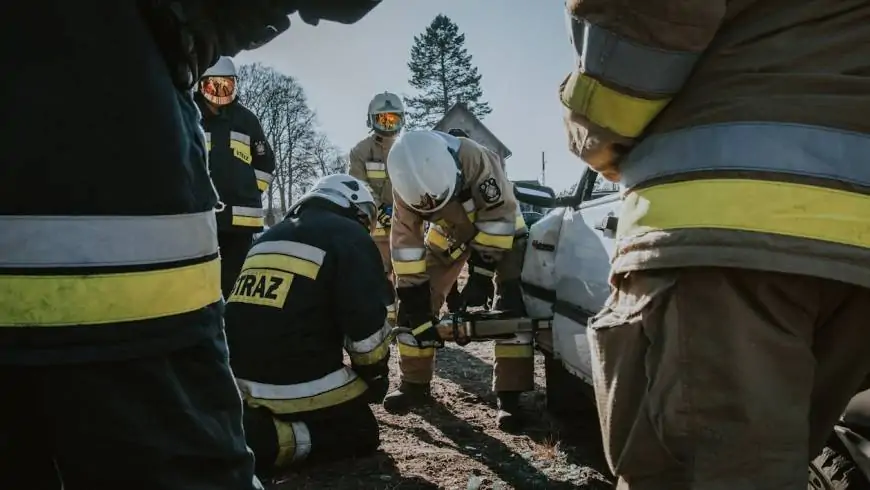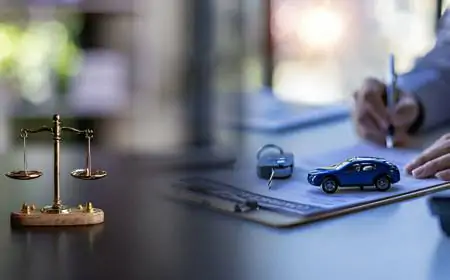Getting smashed by another driver can completely destroy your day.
You're stuck dealing with injuries, crazy medical bills, and a car that's now scrap metal. And if you're like most people, you're probably thinking "What the hell do I do now?"
Here's the truth: Car accidents happen every 13 minutes in the United States. With 6 million car accidents happening every single year, you're definitely not alone in this mess.
But here's the good news...
You've got options. Real options that can get you the money you deserve for your injuries, lost wages, and busted-up car.
What you'll discover:
-
Your Legal Rights After a Car Accident
-
Filing Insurance Claims: Your First Line of Defense
-
When Insurance Isn't Enough: Legal Action Options
-
Understanding Fault and Liability Laws
-
The Importance of Acting Quickly
Your Legal Rights After a Car Accident
Let's cut straight to the chase.
After getting hit by another driver, you've got several legal rights that protect you from getting screwed over by insurance companies or other drivers. Understanding these rights is absolutely crucial because they're the foundation of every single legal option you have.
Your core legal rights include:
-
The right to seek compensation for medical expenses
-
The right to recover lost wages and future earning capacity
-
The right to claim property damage costs
-
The right to compensation for pain and suffering
-
The right to legal representation
But here's what most people don't realize...
Having rights and actually knowing how to use them are two completely different things. That's where understanding your legal options becomes critical for getting the compensation you deserve.
Most car accident victims make the same stupid mistake – they accept the first settlement offer from an insurance company without exploring all their options. This can cost you thousands – sometimes tens of thousands – of dollars in compensation that's rightfully yours.
Filing Insurance Claims: Your First Line of Defense
Insurance claims are usually the first thing most people think about after a car accident. And for good reason – they're designed to get you quick cash without dragging you through lengthy court battles.
You've got three main types of insurance claims:
First-Party Claims: These are claims you file with your own insurance company. If you've got comprehensive coverage, collision coverage, or personal injury protection, you can file a claim no matter who caused the accident.
Third-Party Claims: These are claims you file directly with the other driver's insurance company. The other driver's liability insurance should cover your medical bills, property damage, and other losses if they were at fault.
Uninsured/Underinsured Motorist Claims: If the at-fault driver doesn't have insurance or doesn't have enough coverage, you can file a claim under your own uninsured/underinsured motorist coverage.
The key to maximizing your insurance claim is documentation. Take photos of the accident scene, get witness statements, and keep detailed records of all your medical treatments and expenses.
But here's the challenge: Insurance companies are businesses. Their goal is to pay out as little as possible while still settling your claim. They've got experienced adjusters and lawyers working around the clock to minimize your compensation.
That's why many accident victims turn to an Arizona car accident lawyer to level the playing field. Experienced attorneys understand exactly how insurance companies operate and can negotiate much higher settlements than most people can achieve on their own.
When Insurance Isn't Enough: Legal Action Options
Sometimes insurance claims just aren't enough to fully compensate you for your losses. This is especially true in severe accidents with serious injuries or when the at-fault party is uninsured or underinsured.
Here are your legal action options:
Personal Injury Lawsuits
A personal injury lawsuit lets you seek compensation way beyond what insurance companies are willing to pay. Unlike insurance claims, lawsuits can recover damages for pain and suffering, emotional distress, and punitive damages in cases involving particularly reckless behavior.
Personal injury lawsuits are particularly valuable when:
-
Your injuries are severe or permanent
-
You've lost significant income or earning capacity
-
The insurance settlement offer is unreasonably low
-
The at-fault party was driving under the influence or engaging in other reckless behavior
Small Claims Court
For minor accidents with damages under your state's small claims limit (usually $5,000 to $10,000), small claims court can be a cost-effective option. You don't need a lawyer, the process is relatively quick, and filing fees are minimal.
Small claims court works best when:
-
Damages are relatively minor
-
Fault is clear-cut
-
You have good documentation
-
The other party has assets to pay a judgment
Arbitration and Mediation
Some insurance policies include arbitration clauses that require disputes to be resolved through arbitration rather than court litigation. Mediation is a voluntary process where a neutral third party helps both sides reach a settlement.
These alternative dispute resolution methods can be faster and less expensive than traditional litigation.
Understanding Fault and Liability Laws
Your legal options depend heavily on your state's fault and liability laws. These laws determine who can be held responsible for an accident and exactly how much compensation you can recover.
Most states follow one of these systems:
Fault-Based Systems: In these states, the at-fault driver's insurance pays for damages. You can file a claim with the at-fault driver's insurance or sue them directly for compensation.
No-Fault Systems: These states require each driver's insurance to cover their own medical expenses and lost wages regardless of who caused the accident. You can still sue for serious injuries, but the threshold for lawsuits is higher.
Comparative Negligence: Even if you're partially at fault for an accident, you can still recover damages. However, your compensation will be reduced by your percentage of fault. For example, if you're 20% at fault, you can recover 80% of your damages.
Understanding these laws is crucial because they directly impact your legal options and potential compensation.
The Importance of Acting Quickly
Time is definitely not on your side after a car accident.
Every single legal option has specific time limits, known as statutes of limitations, that can completely bar you from seeking compensation if you wait too long.
Key time limits to remember:
-
Insurance claims must typically be filed within 30 days
-
Personal injury lawsuits must be filed within 2-3 years in most states
-
Property damage claims often have shorter deadlines
-
Evidence disappears and witness memories fade over time
But here's something most people don't know...
Early estimates from the National Highway Traffic Safety Administration show traffic fatalities have decreased by 3.8% in 2024 compared to 2023. While this is encouraging, it still means over 39,000 people died in traffic crashes last year.
Don't become another statistic. Take action quickly to protect your legal rights.
Moving Forward After Your Accident
Car accidents are traumatic experiences that can have lasting physical, emotional, and financial consequences. But understanding your legal options gives you the power to take control of your situation and fight for the compensation you deserve.
Remember these key takeaways:
-
You have multiple legal options available after a car accident
-
Insurance claims are usually the first step, but they're not always enough
-
Legal action can provide compensation beyond what insurance companies offer
-
Time limits apply to all legal options, so act quickly
-
Professional legal advice can help you choose the best path forward
Don't let insurance companies or other drivers take advantage of your situation. You have rights, and you have options. The key is understanding them and taking action to protect your interests.
Your recovery depends on more than just medical treatment – it depends on securing the financial resources you need to rebuild your life. With the right legal strategy, you can get compensation and move forward with confidence.











